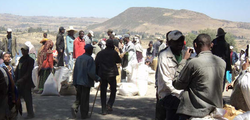Radio Netherlands Worldwide | 18 February 2011
By Luc van Kemenade
In Ethiopia large plots of rural land are being leased to foreign investors. According to critics this disadvantages local farmers.
They talk about ‘land grab’ and ‘neo-colonialism’. In Hidi, a small town in the Ethiopian Oromo region, farmers disagree: “We know how to take opportunities.”
While women prepare themselves for the weekly Tuesday market in Hidi, approximately sixty kilometers south of the Ethiopian capital Addis Ababa, farmers gather in a nearby tej bet, a honey wine bar, and order their first beverage of many.
In recent years sixteen investors, from Israel, Ethiopia and the Netherlands, have opened large-scale farms nearby the village. In order to obtain their hectares they had to ‘buy out’ local farmers who used the land for farming and living.
“We were eager to sell,” says Shefaro Kebede. The farmer recalls that investors came to his village to negotiate directly with the locals.
Agreement
“We sat down and talked, face-to-face, and came to an agreement.”
In a verbal agreement farmland was leased for fifteen years against 2,000 birr (87 euro) per 2,500 square meters a year. If plots were used for accommodation of investors they were permanently ‘sold’ for 39,000 birr (1,703 euro) per 2,500 square meters. When investors leave the land, it returns to the Ethiopian state.
“Nowadays, the land will be worth at least 3,000 birr (131 euro) per 2,500 square meters,” Shefaro says. “But we are not being compensated.”
Girma Negash sold one hectare of his land to Solagrow, a Dutch-owned potato grower in Hidi. “I earned a lot of money,” he says. “This helped me become an investor myself. I bought a new plot on which my employers grow and harvest teff, wheat and barley.”
If invested smartly, farmers can benefit from selling their land, Girma points out. “It’s a challenge, but we know how to take such an opportunity.” Also, it helps the community in general, he says. The investors in Hidi provide jobs, have made clean drinking water available and built a free health clinic. “We learn more about irrigation and good seeds are available now,” Girma adds, “this makes farming more profitable.”
Not only success stories
The customers of the tej bet indicate that not every farmer is able to deal with newly obtained wealth. In Hidi one farmer managed to lose his earnings in just one year. “Ayane Gurmetcha, my neighbour, spent it all on drinking, dancing and prostitutes,” one of them says.
“It is complicated,” Ayane responds. The now landless and jobless farmer says he built a wooden house and started farming on a rented plot shortly after. “But a failed harvest ruined everything,” he says.
“I even had to take my son from school.” While looking at his half-liter draft beer he says: “I am not an exceptional drinker. No one in this village will go home at the end of the day without having tasted alcohol.












